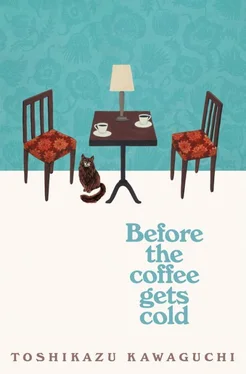‘Yes.’
Nagare immediately responded. ‘With her?’ he asked, pointing to Kei.
‘Yes,’ said the girl cheerily.
‘Are you saying that you came to see her?’ asked Kazu.
‘Yes.’
Kei’s eyes beamed brightly at this unknown girl’s sudden confession. Kei was never suspicious of strangers. So rather than asking the girl who she was or why she wanted the photo, she immediately said, ‘Oh! Really? Can I fix my make-up first?’
She pulled out a case from her shoulder bag and began fixing her make-up.
‘Um, there’s no time,’ the girl said urgently.
‘Oh… No, of course.’
Naturally, Kei knew the rules well. Her cheeks flushed as she snapped the case shut.
The girl was prevented from positioning herself alongside Kei, as you would normally do when asking for a photo, by the rule prohibiting her to move from that seat. Kei passed her convenience-store plastic bag and straw hat to Kazu and stood next to the girl.
‘Where’s your camera?’ asked Kazu.
The girl pushed something towards her across the table.
‘Huh? Is that a camera?’ asked Kei in surprise, as Kazu looked at the camera handed to her. It had the dimensions of a business card. Wafer-thin and semi-transparent, it just looked like a plastic card.
Kei was fascinated by it. She took a close look at it from all angles. ‘It’s so thin!’
‘Um, we have to hurry. Time is almost up,’ the girl said calmly to Kei.
‘Yes, I’m sorry,’ said Kei, shrugging her shoulders and standing alongside the girl again.
‘OK, I’m taking it.’ Kazu pointed the camera at the two. It didn’t seem difficult to use, she just pressed the button that appeared in the screen.
Click
‘What? Wait a bit, when are you going to take it?’ said Kei.
Kazu had taken the picture while Kei was adjusting her hair and arranging her fringe. She handed the camera back to the girl.
‘You already took it? When did you do that?’ The girl and Kazu were both very businesslike. Kei alone was full of questions and confused.
‘Thank you very much,’ said the girl and immediately drank the remainder of her coffee.
‘What…? Just a minute,’ Kei said. But the girl vaporized into steam. As the steam rose towards the ceiling, the woman in the dress appeared from underneath it. It looked like a transformation trick worthy of a ninja.
As all three were used to such things happening, no one was particularly surprised. If another customer had seen it they would have been shocked. If a customer ever did see such a thing they would be told it was a parlour trick – though if the cafe staff were asked how they performed this trick, they would be unable to provide an answer.
The woman in the dress was reading her novel casually as if nothing had happened. However, when she noticed the tray, she pushed it away with her right hand, which clearly meant: Take that away!
When Kei went to clean up the tray, Nagare took it from her, tilted his head to one side, and disappeared into the kitchen.
‘I wonder who that was,’ Kei muttered. She retrieved the plastic convenience-store bag and straw hat from Kazu and retreated to the back room.
Kazu kept staring at that chair where the woman in the dress was sitting. It was clear by the look on her face that something was bothering her.
This was the first time a customer had come from the future to meet Nagare, Kei, or Kazu. There had never seemed to be a good reason why anyone would want to go back in time to see one of the cafe staff members who were always in the cafe.
Yet a girl had just come from the future to meet Kei.
Kazu didn’t interrogate or press anyone on why they had visited from the future. Even if, say, a murderer travelled back in time, she would have a good reason to leave it alone: the rule was that the present doesn’t change no matter how much one tries to rearrange things in the past. This rule could never be broken. A series of random events would always somehow unfold to prevent the present from changing. If, for example, a gunman came from the future and fatally shot a customer – as long as the customer was living in the future, he could not die, even if he had been shot in the heart.
That was the rule.
Kazu or whoever was there would call the ambulance and the police. The ambulance would leave for the cafe. This ambulance would not get caught in traffic. The ambulance would travel from the emergency centre to the cafe and carry the patient from the cafe to the hospital using the shortest distance and in the fastest time. On looking at the patient, the hospital staff might say, ‘ We probably can’t save him. ’ Even if that happened, then a world-leading surgeon would happen to be visiting the hospital and would operate on the patient. Even if the victim’s blood was a rare type that only one in several ten thousand possessed, there would be a stock of such blood at the hospital. The surgery staff would be excellent and the operation would be successful. The surgeon might say later that if the ambulance had been one minute later or if the bullet had been located one millimetre to the left, the patient would not have survived. All the staff would say that it was a miracle the patient survived. But it wouldn’t be a miracle. It would be because of the rule which dictated that the man who was shot in the past must survive.
Because of this, Kazu didn’t mind who came from the future, for whatever reason. Everything a visitor from the future might try would be futile.
‘Could you do this for me, please,’ Nagare called from the kitchen.
Kazu turned and looked to see Nagare standing at the kitchen door holding the tray containing the coffee brewed for the woman in the dress. She took the tray and started carrying it to the table where the woman was sitting.
For a while she stared at the woman, while thoughts went around in her head. What did that girl come back for, I wonder? If it was to take a picture of Kei, why did she go to the effort of returning to the past?
CLANG-DONG
‘Hello, welcome,’ Nagare shouted. Kazu collected her thoughts and served the coffee.
( I feel like there is something important that I’m missing. )
To dispel the feeling, she gave her head a little shake.
‘Hello.’ Kohtake had entered the cafe. She was on her way home from work.
She was wearing a lime-green polo shirt and a white skirt with black pumps on her feet. She had a canvas bag hanging from her shoulder.
‘Hello, Kohtake,’ Nagare said.
On hearing her name called, she spun round on her heel as if to walk out again.
‘Ah, sorry. Mrs Fusagi,’ he corrected himself. Kohtake smiled with approval and sat at the counter.
It was now three days since Kohtake had returned to the past and received the letter that Fusagi had written but never given to her. She now insisted upon ‘Mrs Fusagi’.
She hung her bag on the back of her chair. ‘Coffee, please,’ she ordered.
‘Certainly,’ Nagare said, bowing his head and turning to the kitchen to brew the coffee.
She looked around the empty cafe, flexed her shoulders, and took a deep breath. She had planned to accompany Fusagi on his walk home if he had been at the cafe, so she was a little disappointed. Kazu, who had been watching the exchange between Nagare and Kohtake with a smile, had finished serving the woman in the dress.
‘I’m just taking my break,’ she said and disappeared into the back room. Kohtake said, ‘OK,’ and gave her a little wave.
It was early August and summer was really peaking. Kohtake, though, liked her coffee hot, even in summer. She liked the aroma of it when it was freshly brewed. She couldn’t enjoy iced coffee in the same way. Coffee was far more pleasurable when it was hot.
Читать дальше













